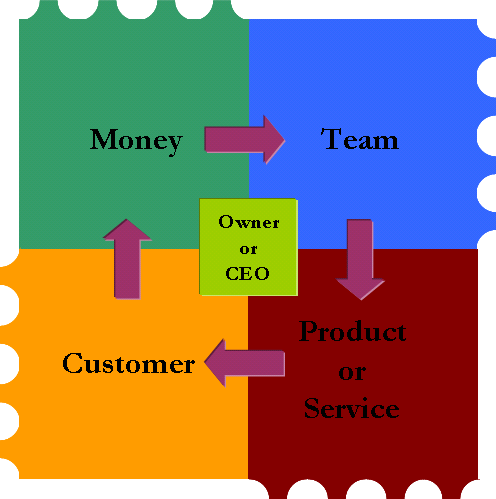 I was reading an interesting thread on Hacker News where the poster wanted to find out how he can become a millionaire in 3 years. One of the commenter has replied beautifully sharing his pearls of wisdom. Blatantly copying / pasting the bullets I liked (ignore this and go straight to the source, otherwise), here’s what the commenter said you need to have / look for to become a “success” and not necessarily a millionaire:
I was reading an interesting thread on Hacker News where the poster wanted to find out how he can become a millionaire in 3 years. One of the commenter has replied beautifully sharing his pearls of wisdom. Blatantly copying / pasting the bullets I liked (ignore this and go straight to the source, otherwise), here’s what the commenter said you need to have / look for to become a “success” and not necessarily a millionaire:
- Market opportunity – a million dollars isn’t a lot in the grand scheme of things, but it certainly is a lot if the market opportunity is not large enough. Even if you put Bill Gates and Steve Jobs as founders in a new venture with a total market size of 10 million, there is no way they could become too wealthy without completely changing the business
- Inequality of information – find a place where you know something that many undervalue. Having this inequality of information can give you, your first piece of leverage
- Leverage skills you know– You can go into new fields such as say Finance, but make sure you’re leveraging something you already know such as technology and/or product.
- Look in obscure places– We’re often fascinated with the shiny things in the internet industry. Many overlook the obscure and unsexy. Don’t make that mistake. If your goal has primarily monetary motivations, look at the unsexy.
- Surround yourself with smart people– smart people whom are successful usually got there by doing the same and have an innate desire to help those do the same.
- Charge for something– Building a consumer property dependent upon advertising has easily made many millionaires, but it isn’t the surest path. Build something that you can charge for.
- Go with your gut and do not care about fameballing– Go with what your gut says, regardless of how it might look to the rest of the world.
- Be an unrelenting machine– Brick walls are there to show you how bad you want something. Commit to your goals and do not waver from them a one bit regardless of what else is there. I took this approach to losing weight and fitness. I have not missed a single 5k run in over a year. It did not matter if I had not slept for two days, traveling across the country, or whatever else. If your goals is to become a millionaire, you need to be an unrelenting machine that does not let emotions make you give up / stop. You either get it done with 100% commitment or you don’t. Be a machine.
- If it’s a “trend”, it’s too late
- Be a master of information– Many think it might be wasteful that I spent so much time on newsyc or read so many tech information sites. It’s not, it’s what gives me an edge. I feel engulfed.
- Get out and be social– Even if you’re an introvert, being around people will give you energy.
When I first saw the cover (probably in my 8th grade) of Jimi Hendrix’s album ‘Axis: Bold as love’, I was like WTF, how can he do it to the deities? Hendrix is depicted as two Vedic deities, with the multiple hands of Durga and as avatars of Vishnu.
As a startup entrepreneur one has to embody multiple incarnations in one single lifeycle and that pic above is very relevant. What the commenter mentioned above is a lot of things to be done in a short span, but yeah, not every startup gets there, unless you have multiple hands and heads.
 you have an office (or fake it) but must have a land-line at office. If you work from home then you are out of luck! Does not matter how much money you have in bank or a few international credit cards to carry around. I have a debit card which is not accepted by any online portal (Thanks to Hongkong bank).
you have an office (or fake it) but must have a land-line at office. If you work from home then you are out of luck! Does not matter how much money you have in bank or a few international credit cards to carry around. I have a debit card which is not accepted by any online portal (Thanks to Hongkong bank). be done through the phone directly and billed to my monthly statements or debited from my top-up. Banks are too big to be worried about longer tail of small value transactions, operators do not have the teeth, nor the desire to deal with the complexities of 3rd party purchases flowing through them. The laws are falling in place, consumers are ready to make those purchases — missing is the technology piece and a desire to experiment in these areas. This is a space to watch. The potential is beyond imagination when convergence of commerce and owners of mobile & users of internet takes place.
be done through the phone directly and billed to my monthly statements or debited from my top-up. Banks are too big to be worried about longer tail of small value transactions, operators do not have the teeth, nor the desire to deal with the complexities of 3rd party purchases flowing through them. The laws are falling in place, consumers are ready to make those purchases — missing is the technology piece and a desire to experiment in these areas. This is a space to watch. The potential is beyond imagination when convergence of commerce and owners of mobile & users of internet takes place.
 The chart shows four tangible entities which are the main constituents of a business. Each constituent is in it’s own quadrant.The inbound arrow depicts movement or utilization of a resource. As owner/CEO, you create the business. The Team which you hire creates the product or service. This is consumed by a Customer which brings Money to the business. The Money in turn funds the Team. If the Team is weak or inefficient it would impact the product or service. Even more, an incompetent team may consume the money unwisely thus hampering the overall cycle of the business. Though the business revolves around the presence of the Owner/Founder/CEO, the continuum of the business is maintained by the efficiency of the team.
The chart shows four tangible entities which are the main constituents of a business. Each constituent is in it’s own quadrant.The inbound arrow depicts movement or utilization of a resource. As owner/CEO, you create the business. The Team which you hire creates the product or service. This is consumed by a Customer which brings Money to the business. The Money in turn funds the Team. If the Team is weak or inefficient it would impact the product or service. Even more, an incompetent team may consume the money unwisely thus hampering the overall cycle of the business. Though the business revolves around the presence of the Owner/Founder/CEO, the continuum of the business is maintained by the efficiency of the team.